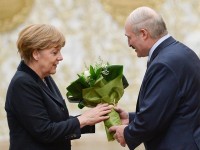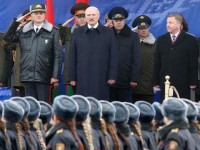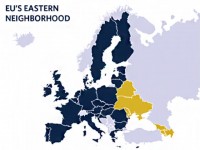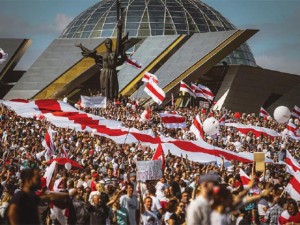Minsk’s muddled media clampdown could jeopardize warming of relations with the West.
In Belarus, a rising fear: Will we be the next Ukraine?

The relationship between Russia and Belarus has never been an easy one. The two former Soviet republics have spent the last two decades on a roller coaster ride — sometimes allies, sometimes adversaries in heated public rows.
Now, as Russia’s neighbors grow increasingly worried about Moscow’s ambitions in the region, Belarus has joined them: The country’s ever-more-tenuous relationship with Moscow has deteriorated to the point of a regional crisis.
The situation echoes the tensions over Ukraine in 2014, when a mass protest movement ousted a Kremlin-friendly president, setting the stage for a Russian invasion and seizure of the Crimean Peninsula. Ukraine’s nearly three-year war with Russian-backed separatist fighters in the east has killed 10,000 and displaced 1.75 million.
Previous disputes between the two countries have followed a predictable pattern that includes oil and gas price wars, public accusations, anti-Belarusan information campaigns from Moscow, and eventually a resolution, said Andrei Yahorau, the director of Center for European Transformation, a regional think tank in Minsk.
This time, though, Russian President Vladimir Putin is showing signs that he is less likely to negotiate.
“What’s different about this crisis is Ukraine, Crimea and the so-called new Cold War,” Yahorau said.
The stakes are now higher.
At the heart of the feud is the status of what is quietly referred to here as the “oil for kisses” deal, in which Russia supplies Belarus with subsidized oil and gas in exchange for Minsk’s loyalty.
When Russia in 2015 refused to lower its gas prices to reflect a decrease in global oil prices, Belarusan President Alexander Lukashenko began exploring closer relations with the West.
Lukashenko has refused so far to recognize Russia’s annexation of Crimea. Last year, he said no to a Kremlin proposal to build a Russian air base in eastern Belarus.
Lukashenko, who has ruled this former Soviet republic with an authoritarian grip for 22 years, bowed to Western pressure in 2015 to release six prominent political prisoners, and ushered in a period of “softening” against political dissent and public gatherings. This earned him cautious praise from Western governments, which subsequently lifted sanctions on Belarus.
With Russia’s economy in decline because of lower oil prices and its own Western sanctions placed after the Crimean annexation, Lukashenko in 2016 turned for help elsewhere, entering loan talks with the International Monetary Fund.
In Moscow, such moves were seen as a betrayal from a country long perceived as a brotherly neighbor, and one heavily subsidized by the Kremlin budget.
Throughout the current crisis, Russian media have been ratcheting up what some say is a Kremlin-orchestrated information war.
Nina Stuzhinskaya, a Belarusan historian from Minsk, said the information campaign is designed to fuel the crisis and spark fears among the Russian public that Belarus is looking to follow Ukraine into an alliance with the West.
In November, Stuzhinskaya appeared as a guest on “Time Will Tell,” a popular, live evening talk show on Russian state-owned television.
The show began with a discussion about how Russia had failed to react quickly enough to stop Ukraine’s betrayal of Moscow during the protests of 2014. The host, Artyom Sheynin, then turned to Belarus, introducing it as a country suffering from a “similar sickness.”
Surrounding the subsequent conversation, Stuzhinskaya said, seemed to be an underlying question of whether Belarus had a right to call itself a separate nation from Russia.
“I went into that show like it was a boxing ring, and I came out feeling like I was the punching bag,” she said.
Already, Russia has shown signs that the Kremlin is willing to react more harshly than in the past.
Russia has banned some Belarusan meat, dairy and other agricultural products, diminishing Minsk’s exports, of which 40% go to Russia. The Kremlin has reduced crude oil shipments to Belarus, hurting another important sector of Belarus’ economy. State-run enterprises refine Russian oil and then sell it abroad.
In January, Minsk announced that it would introduce visa-free travel for tourists from more than 80 countries. Russia responded by moving troops from the Federal Security Services, the successor to the KGB, to the shared border, which had previously stood relatively unchecked.
“What the Lukashenko administration doesn’t accept yet is that the Kremlin is only giving ultimatums now,” said Andrei Porotnikov, a security analyst with the Belarus Security Blog. “Things aren’t going to be resolved in the same way they previously were.”
In recent weeks, public protests have sprung up in Minsk and a few regional cities against an unpopular law instituting a yearly flat tax on the unemployed. So far, the protests have been small, and authorities have not cracked down on demonstrators, a rarity in Lukashenko’s tightly controlled Belarus.
Still, Belarusans are wary of their unpredictable neighbor to the east, who some fear could use the public unrest as a pretext for Russian intervention. Speculation about a possible Crimea-like annexation occurring in Belarus, thus far without foundation, is sparking uneasiness around the country.
When Stuzhinskaya returned to Minsk after the Moscow talk show, her friend picked her up at the airport and said she had seen the show. It’s a good thing Belarus won’t be going the way of Crimea, Stuzhinskaya later recalled her saying on the car ride back to her private house on the outskirts of Minsk.
“I told her, ‘You know what? In Russia’s eyes, we are exactly like Crimea. And that’s what’s so worrying,’” Stuzhinskaya said.
Others
-
In Belarus, a rising fear: Will we be the next Ukraine?
The relationship between Russia and Belarus has never been an easy one. The two former Soviet republics have spent the last two decades on a roller coaster ride — sometimes allies, sometimes adversaries in heated public rows.
-
The EU’s Benign Neglect of Eastern Europe
Between November 6 and December 11, 2015, Carnegie Europe continued its Capitals Series. In this second phase, the focus was on the EU’s Eastern neighbors, which the bloc has so often zigzagged over in trying to establish a coherent policy toward them collectively or bilaterally.
-
New ENP and Civil Society’s Role in Focus of the 7th EaP CSF Annual Assembly (Photo)
The 7th Annual Assembly of the Eastern Partnership Civil Society Forum was held in Kyiv on 19-21 November attracting around 300 participants, observers and guests who attended more than 20 sessions and a Networking Fair in the framework of the Assembly.
-
Is social economy a phenomenon for Belarus?
The conference “Social economy: how to be successful despite the crisis” launched in Minsk on October 22.








Comments
Andrei Yahorau — Al Jazeera: “Lukashenko is irresponsible”
He said Belarus would likely face economic tightening not only as a result of the coronavirus pandemic but also a Russian trade oil crisis that worsened this past winter.